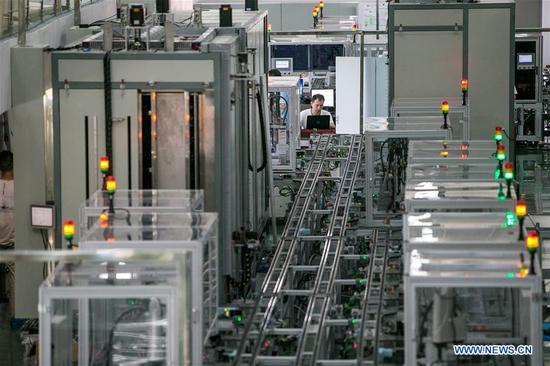Problem-solving
For Danyuan's Hu, despite the increased business revenue, his biggest headache remains achieving smooth logistics and transaction payments across borders.
"Unlike China, which has developed a mature online payment network such as Alipay, overseas buyers sometimes still prefer to use credit cards when conducting transactions," Hu said.
He added that his company still relies on both online and offline payments to solve the problem, adding that it also still uses a cash-on-delivery payment method when working with local logistics companies.
When conducting cross-border e-commerce, companies have to work with banks and regulators. Even cultural differences can add to the stress, hindering smooth transactions.
One Chinese company is tackling such problems.
In September, PingPong Financial Group, a financial technology company in Hangzhou, said its Luxembourg entity, PingPong Europe, had received a license from the Luxembourg government, making it the first Chinese fintech company to establish an office in Europe.
The license enables PingPong, which offers an innovative and streamlined way for sellers to receive international payments from e-commerce platforms, to operate throughout Europe, improving e-commerce transactions between China and the continent through its payments services.
The company, a startup launched in 2015, aims to reduce both the time and costs for Chinese internet sellers to receive international payments from e-commerce platforms in their local currency. It said it is the sole payment platform to focus exclusively on repatriating e-commerce revenue to China.
The European Union's payment licensing requirements are especially stringent, with strict regulations covering infrastructure, shareholder qualifications and information security programs. Only 10 foreign companies have obtained such a license in Luxembourg. Among the Chinese financial services companies to have established a presence in the EU, PingPong is the only startup. The others are all major Chinese banks.
PingPong Financial Group has offices in the U.S., Japan and Luxembourg, as well as its Hangzhou headquarters.
"For the past three years, we've served 250,000 SMEs (small and medium-sized enterprises) in China," said Lu Shuai, co-founder and chief marketing officer.
"I believe SMEs will be the most dynamic economic force in China. Through our services we can now shorten the time for repatriating e-commerce revenue to less than 24 hours, compared with seven to 15 working days before 2016."
To further advance the opening-up drive and transform and upgrade foreign trade, the State Council, China's Cabinet, announced on July 13 that comprehensive cross-border e-commerce experimental zones would be set up in 22 cities.
They include: Beijing; Hohhot, capital of the Inner Mongolia autonomous region; Shenyang, capital of Liaoning province; Nanning, capital of the Guangxi Zhuang autonomous region; Lanzhou, capital of Gansu province; and Yiwu in Zhejiang. Customs clearance procedures will be simplified for e-commerce enterprises.
This move further demonstrates China's belief that e-commerce is the way in which international trade will develop.
Since 2015, China has set up 13 cross-border e-commerce experimental zones. Hangzhou, home to e-commerce giant Alibaba, was the first such zone, and its trade volume in cross-border e-commerce has risen from more than 100 million yuan in 2014 to more than 60 billion yuan last year, with the scale of the industry increasing nearly 500 times.
Cross-border e-commerce has become a new engine for Hangzhou's economic growth and industrial upgrading.
The network of experimental cross-border e-commerce zones formed nationwide lays a solid foundation for them to become a major trade channel, which will boost not only China's exports but also imports to meet the demands of domestic consumers.
Most of the experimental zones are linked with Europe by regular freight rail services, and cross-border e-commerce will boost trade between China and Europe, as well as countries along the Silk Road Economic Belt.
The development of cross-border e-commerce in China will help to promote the balanced development of trade globally, bringing new opportunities to more countries and enterprises, while promoting China's international trade.
Hu, from Danyuan Information Technology, said, "The launch of an e-commerce zone in Yiwu will definitely prompt cross-border online trading firms like us to speed up our layout overseas, prompting us to set up more warehouses to handle exports."
He added that customs clearance efficiency is expected to be greatly improved, significantly reducing the costs for trading companies such as Danyuan.


















































